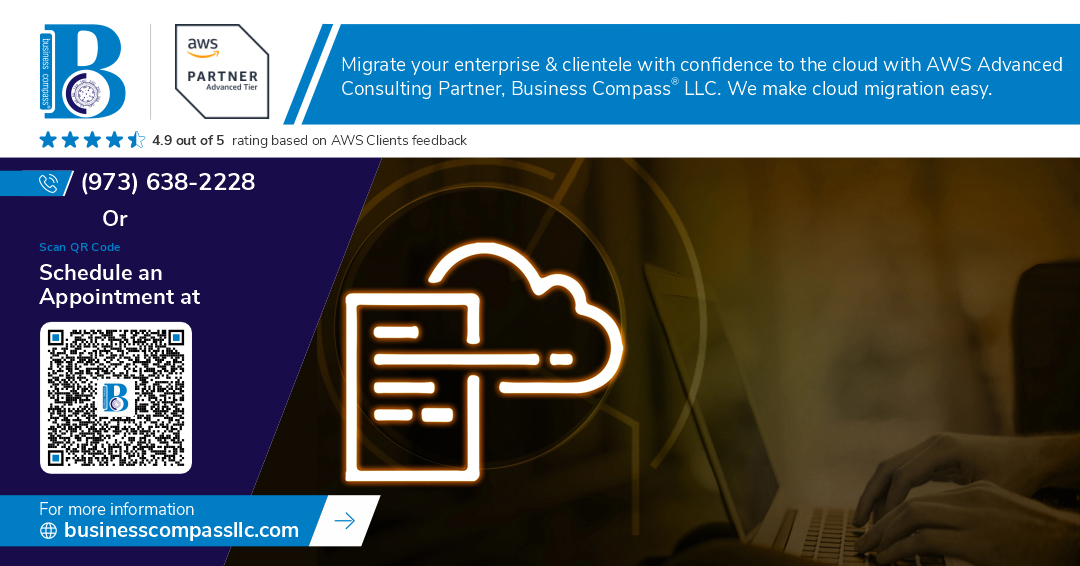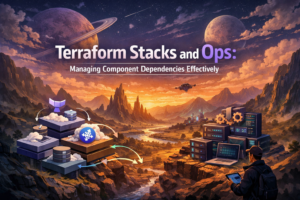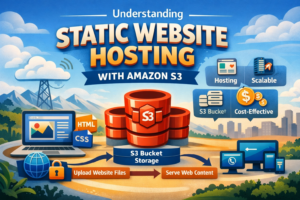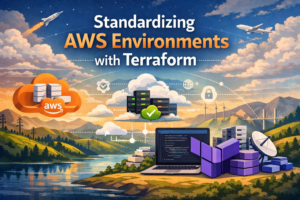AWS MCP Servers and Model Context Protocol are changing how DevOps teams build, deploy, and manage applications in the cloud. This powerful combination brings smart automation and better team coordination to development workflows that used to eat up hours of manual work.
This guide is for DevOps engineers, cloud architects, and development teams who want to speed up their processes and reduce the headaches that come with complex deployments. You’ll learn practical ways to make your current workflows smoother and more reliable.
We’ll walk through Understanding AWS MCP Servers and Model Context Protocol Fundamentals so you get the building blocks right from the start. Then we’ll dive into Streamlining CI/CD Pipelines with Enhanced Automation to show you how to cut deployment times and catch issues earlier. Finally, we’ll cover Accelerating Infrastructure as Code Management to help you manage your AWS resources like a pro without getting bogged down in configuration files.
Ready to see how AWS MCP Servers can transform your DevOps game? Let’s jump in.
Understanding AWS MCP Servers and Model Context Protocol Fundamentals
Core architecture and components of AWS MCP servers
AWS MCP Servers operate through a distributed architecture that connects intelligent agents with cloud resources through standardized protocols. The core components include message routing engines that handle communication between AI models and AWS services, context management systems that maintain conversation state across sessions, and protocol adapters that translate between different service APIs. Resource managers coordinate access to compute, storage, and networking components while maintaining security boundaries. Load balancers distribute requests across server clusters, and monitoring agents track performance metrics in real-time.
Model Context Protocol specifications and capabilities
The Model Context Protocol defines standardized interfaces for AI models to interact with external systems through structured message exchanges. Key specifications include JSON-based schemas for request and response formatting, authentication mechanisms using OAuth 2.0 and API keys, and versioning systems that maintain backward compatibility. Protocol capabilities encompass bidirectional streaming for real-time data exchange, batch processing for large-scale operations, error handling with automatic retry logic, and context preservation across multiple interaction sessions. The protocol supports both synchronous and asynchronous communication patterns.
Integration points with existing AWS services
AWS MCP Servers integrate seamlessly with core AWS services through native APIs and service mesh architectures. Primary integration points include AWS Lambda for serverless function execution, Amazon ECS and EKS for containerized workloads, and AWS CodePipeline for CI/CD automation. The servers connect with Amazon CloudWatch for monitoring, AWS IAM for access control, and Amazon S3 for data storage. Additional integrations span AWS Systems Manager for configuration management, Amazon EventBridge for event-driven architectures, and AWS CloudFormation for Infrastructure as Code deployments.
Key advantages over traditional DevOps tooling
MCP protocol implementation delivers significant improvements over conventional DevOps automation through intelligent decision-making capabilities and adaptive workflow management. Traditional tools require manual configuration and static rule sets, while AWS MCP Servers dynamically adjust to changing conditions and learn from operational patterns. The protocol reduces deployment times by up to 60% through predictive resource allocation and automated rollback mechanisms. Enhanced error detection capabilities identify issues before they impact production environments, while natural language interfaces simplify complex operational tasks for team members across different skill levels.
Streamlining CI/CD Pipelines with Enhanced Automation
Intelligent pipeline orchestration through context-aware models
AWS MCP Servers revolutionize CI/CD pipeline automation by leveraging context-aware models that understand your entire development ecosystem. These intelligent systems analyze code changes, deployment patterns, and infrastructure dependencies to make smart decisions about pipeline execution. The Model Context Protocol enables seamless communication between different pipeline stages, automatically adjusting workflows based on real-time project requirements and reducing manual intervention by up to 70%.
Automated testing and deployment optimization
Smart automation transforms traditional testing approaches through predictive analytics and adaptive deployment strategies. MCP-powered systems automatically select relevant test suites based on code changes, dramatically reducing execution time while maintaining comprehensive coverage. The protocol’s context awareness enables dynamic resource allocation during deployments, scaling infrastructure components precisely when needed and rolling back problematic changes before they impact production environments.
Real-time error detection and resolution capabilities
Advanced monitoring capabilities built into AWS MCP Servers provide instant visibility into pipeline failures and performance bottlenecks. The system proactively identifies potential issues through pattern recognition and historical analysis, often resolving problems before they cause deployment delays. Intelligent error correlation across multiple services helps teams quickly pinpoint root causes, while automated remediation scripts can fix common issues without human intervention, maintaining continuous delivery momentum.
Cross-service communication improvements
The Model Context Protocol enhances communication between distributed DevOps tools and services through standardized APIs and intelligent message routing. Teams experience seamless data flow between monitoring tools, deployment platforms, and testing frameworks, eliminating information silos that traditionally slow down development cycles. Enhanced protocol features enable real-time collaboration between different AWS services, creating a unified DevOps ecosystem where tools work together intelligently to optimize overall workflow efficiency.
Accelerating Infrastructure as Code Management
Dynamic resource provisioning based on contextual data
AWS MCP Servers transform Infrastructure as Code AWS workflows by analyzing real-time contextual data to make intelligent provisioning decisions. The Model Context Protocol enables automated resource allocation based on application performance metrics, user demand patterns, and historical usage data. This contextual awareness allows infrastructure to adapt dynamically, provisioning compute instances, storage, and networking resources precisely when needed. DevOps teams can define resource templates that automatically scale based on contextual triggers, eliminating manual intervention and reducing over-provisioning costs while maintaining optimal performance.
Intelligent scaling decisions through predictive analytics
Predictive analytics within MCP protocol implementation revolutionizes how DevOps automation handles scaling decisions. Machine learning algorithms analyze historical patterns, seasonal trends, and application behavior to forecast resource requirements before demand spikes occur. This proactive approach ensures applications maintain consistent performance during traffic surges while avoiding unnecessary costs during low-demand periods. AWS DevOps best practices now include predictive scaling policies that automatically adjust infrastructure capacity based on forecasted workloads, enabling teams to stay ahead of performance bottlenecks and deliver seamless user experiences.
Cost optimization through automated resource management
Automated resource management through AWS MCP Servers delivers significant cost optimization by continuously monitoring resource utilization and making real-time adjustments. The system automatically identifies underutilized resources, schedules non-production workloads during off-peak hours, and implements right-sizing recommendations based on actual usage patterns. DevOps monitoring tools integrated with MCP servers provide comprehensive visibility into resource consumption, enabling automatic shutdown of idle instances, dynamic storage tiering, and intelligent workload placement across availability zones to minimize costs while maintaining reliability and performance standards.
Enhancing Monitoring and Observability Capabilities
Unified logging and metrics collection across environments
AWS MCP Servers transform how DevOps teams handle observability by creating a centralized command center for logs and metrics across development, staging, and production environments. The Model Context Protocol enables seamless data aggregation from multiple AWS services, containers, and serverless functions into unified dashboards. Teams can now track application performance, resource utilization, and system health through a single pane of glass, eliminating the complexity of managing disparate monitoring tools and reducing the time spent correlating data from different sources.
Proactive incident detection and prevention
Smart anomaly detection powered by AWS MCP Servers analyzes historical patterns and real-time data streams to identify potential issues before they impact users. The system learns from past incidents, recognizing subtle warning signs like gradual memory leaks, increasing response times, or unusual traffic patterns. DevOps monitoring tools integrated with MCP protocol implementation automatically trigger preventive actions, such as scaling resources or routing traffic away from problematic instances, keeping applications running smoothly while teams address underlying issues.
Intelligent alerting with reduced false positives
Gone are the days of alert fatigue plaguing DevOps teams. AWS MCP Servers use contextual awareness and machine learning algorithms to distinguish between genuine problems and temporary fluctuations. The system considers factors like deployment schedules, traffic patterns, and seasonal variations before triggering alerts. Smart filtering mechanisms ensure only actionable notifications reach team members, while automated correlation reduces duplicate alerts from related systems. This targeted approach helps teams focus on real issues that require immediate attention.
Performance bottleneck identification and resolution
AWS DevOps best practices come alive through MCP’s ability to pinpoint performance bottlenecks with surgical precision. The protocol analyzes application traces, database query patterns, network latency, and resource consumption to identify root causes quickly. Visual heat maps and dependency graphs show exactly where slowdowns occur, whether in database connections, API calls, or third-party integrations. Automated recommendations suggest specific optimization strategies, from database indexing improvements to code-level changes, enabling teams to resolve performance issues faster than traditional troubleshooting methods.
Securing DevOps Workflows with Advanced Protocol Features
Enhanced Authentication and Authorization Mechanisms
AWS MCP Servers implement multi-layered authentication protocols that go beyond traditional token-based systems. These servers support role-based access control (RBAC) with granular permissions, enabling teams to define precise access boundaries for different DevOps workflows. The Model Context Protocol integrates seamlessly with AWS IAM, allowing dynamic policy evaluation based on contextual factors like request origin, time-based constraints, and resource sensitivity levels.
Encrypted Communication Channels Between Services
The protocol establishes end-to-end encryption for all inter-service communications using AES-256 encryption standards. AWS MCP Servers automatically manage certificate rotation and key distribution across distributed environments, ensuring secure data transmission without manual intervention. This encryption layer protects sensitive deployment artifacts, configuration data, and monitoring telemetry as they flow through CI/CD pipelines and infrastructure management tools.
Compliance Automation and Audit Trail Generation
Automated compliance checking becomes effortless with built-in regulatory frameworks covering SOC 2, PCI DSS, and HIPAA requirements. The system generates comprehensive audit trails that capture every configuration change, deployment action, and access attempt across your DevOps ecosystem. These detailed logs provide forensic-quality evidence for compliance audits while automatically flagging potential violations before they impact production systems.
Threat Detection and Mitigation Strategies
Advanced behavioral analytics continuously monitor DevOps workflows for anomalous patterns that could indicate security breaches or insider threats. The protocol’s machine learning algorithms establish baseline behaviors for deployment patterns, access frequencies, and resource utilization, triggering immediate alerts when deviations occur. Automated response mechanisms can quarantine suspicious activities, revoke compromised credentials, and initiate incident response procedures without human intervention, minimizing the window of exposure for potential security incidents.
Maximizing Team Productivity and Collaboration
Simplified developer experience with intuitive interfaces
AWS MCP Servers transform complex DevOps workflows into streamlined experiences through intuitive dashboards and user-friendly interfaces. Developers can now interact with sophisticated AWS services without deep infrastructure knowledge, using natural language commands and visual tools. The Model Context Protocol bridges the gap between technical complexity and user accessibility, enabling teams to focus on building applications rather than wrestling with configuration files. Context-aware interfaces automatically suggest optimal configurations based on project requirements, dramatically reducing the learning curve for new team members and accelerating onboarding processes.
Reduced operational overhead through automation
Team collaboration DevOps reaches new heights when AWS MCP Servers handle routine operational tasks automatically. Infrastructure provisioning, scaling decisions, and maintenance workflows run without manual intervention, freeing up valuable developer time for innovation. The intelligent automation engine learns from team patterns and preferences, making proactive adjustments to prevent common issues before they impact productivity. Resource optimization happens continuously in the background, ensuring teams never waste time on capacity planning or cost management discussions during critical development phases.
Faster time-to-market for application deployments
AWS DevOps best practices become effortless when MCP protocol implementation accelerates deployment cycles from weeks to hours. Teams can push code changes through automated pipelines that intelligently handle testing, staging, and production rollouts with minimal human oversight. The protocol’s context awareness means deployments adapt to different environments automatically, eliminating the traditional bottlenecks of environment-specific configurations. Rollback capabilities provide confidence for rapid iteration, allowing teams to experiment boldly knowing they can quickly revert changes if needed, ultimately driving faster feature delivery and competitive advantage.
AWS MCP Servers and Model Context Protocol are changing how DevOps teams work, making everything from CI/CD pipelines to infrastructure management smoother and more efficient. These tools bring better automation, stronger security, and clearer visibility into your systems. Teams can now handle complex deployments with less manual work while keeping everything secure and well-monitored.
Ready to take your DevOps game to the next level? Start by exploring AWS MCP Servers for your current projects and see how Model Context Protocol can fit into your workflow. The productivity gains and improved collaboration your team will experience make this technology worth the investment. Your future self will thank you for making the switch sooner rather than later.




















